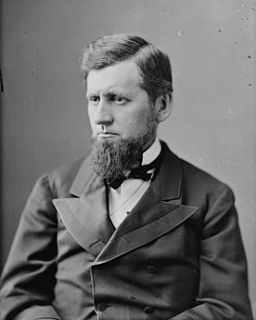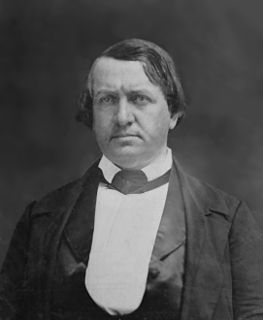
The United States Senate elections of 1936 coincided with the reelection of President Franklin D. Roosevelt. The Great Depression continued and voters backed progressive candidates favoring Roosevelt's New Deal in races across the country. The Democrats gained 5 net seats during the election, and in combination with Democratic and Farmer–Labor interim appointments and the defection of George W. Norris from the Republican Party to become independent, the Republicans were reduced to 16 seats, the most lopsided Senate since Reconstruction.
The United States Senate elections of 1848 and 1849 were elections which had the Democratic Party lose seats but maintain control of the United States Senate.

The United States Senate elections of 1858 and 1859 were elections which had the Republican Party gain five additional seats in the United States Senate, but the Democrats retained their majority. That majority would erode in 1860 with the secession of the southern states leading up to the Civil War. In Illinois, incumbent Stephen A. Douglas (D) and challenger Abraham Lincoln (R) held a series of seven debates, known as the "Lincoln–Douglas debates."
The United States Senate elections of 1856 and 1857 were elections which had the young Republican Party assume its position as one of the United States's two main political parties. The Whigs and Free Soilers were gone by the time the next Congress began.
In the United States Senate elections of 1870 and 1871, the Republican Party lost five seats in the United States Senate, though it still retained an overwhelming majority. In advance of these elections, the last four seceded states were readmitted to the Senate.
The United States Senate elections of 1872 and 1873 were elections which had the Republican Party, while still retaining a commanding majority, lose two seats in the United States Senate. By the beginning of the Congress, however, they'd lost three more: two as defections to the Liberal Republican Party, and one a resignation of Henry Wilson to become U.S. Vice President. These elections also coincided with President Ulysses S. Grant's easy re-election.
The United States Senate elections of 1876 and 1877 had the Democratic Party gain five seats in the United States Senate, and coincided with Rutherford B. Hayes's narrow election as President. Republicans remained in the majority, however.

The United States Senate elections of 1900 and 1901 were elections in which the Democratic Party gained two seats in the United States Senate, and which corresponded with President William McKinley's landslide re-election. By the beginning of the next Congress, however, the Republicans gained five additional seats, giving them a ten-seat majority.
The United States Senate elections of 1878 and 1879 were elections which had the Democratic Party retake control of the United States Senate for the first time since before the Civil War.
The United States Senate elections of 1844 and 1845 were elections which, coinciding with James K. Polk's election, had the Democratic Party retake control of the United States Senate, gaining a net total of eleven seats from the Whigs.
The United States Senate elections of 1882 and 1883 saw the Republicans retain a narrow majority — 39 out of 76 — with the Readjusters in their caucus.
The United States Senate elections of 1888 and 1889 were elections that coincided with Benjamin Harrison's victory over incumbent President Grover Cleveland. Both parties were unchanged in the general elections, but later special elections would give Republicans an eight-seat majority, mostly from newly admitted states.

The United States Senate elections of 1906 and 1907 were elections which had the Republican Party gain three seats in the United States Senate, expanding their majority to more twice that of the opposing Democratic Party.
The United States Senate elections of 1842 and 1843 were elections which had the Whigs lose seats but maintain control of the United States Senate. Although they lost three seats in the general elections, they gained two of them back by the start of the first session in special elections.
The United States Senate elections of 1838 and 1839 were elections which had the Democratic Party lose seven seats in the United States Senate, but still retain a majority.
The United States Senate elections of 1820 and 1821 were elections for the United States Senate that, corresponding with James Monroe's landslide re-election, had the Democratic-Republican Party gain seven seats, assuming almost complete control of the Senate.
The United States Senate elections of 1836 and 1837 were elections that had the Jacksonian coalition emerge as the Democratic Party, and the Adams, or Anti-Jackson, coalition emerge as the Whig Party
The United States Senate elections of 1864 and 1865 were elections corresponding with Abraham Lincoln's re-election, with the Republican Party gaining two seats in the United States Senate. As these elections occurred during the Civil War, most of the Southern States were absent.
The United States Senate elections of 1860 and 1861 were elections corresponding with Abraham Lincoln's election to the presidency. The nascent Republican Party increased their Senate seats in the general elections, and after southern Democrats withdrew to join the Confederacy, Republicans gained control of the United States Senate. To establish a quorum with fewer members, a lower total seat number was taken into account.
The United States Senate elections of 1822 and 1823 were elections for the United States Senate that had the Democratic-Republican Party continue almost complete control of the Senate.








